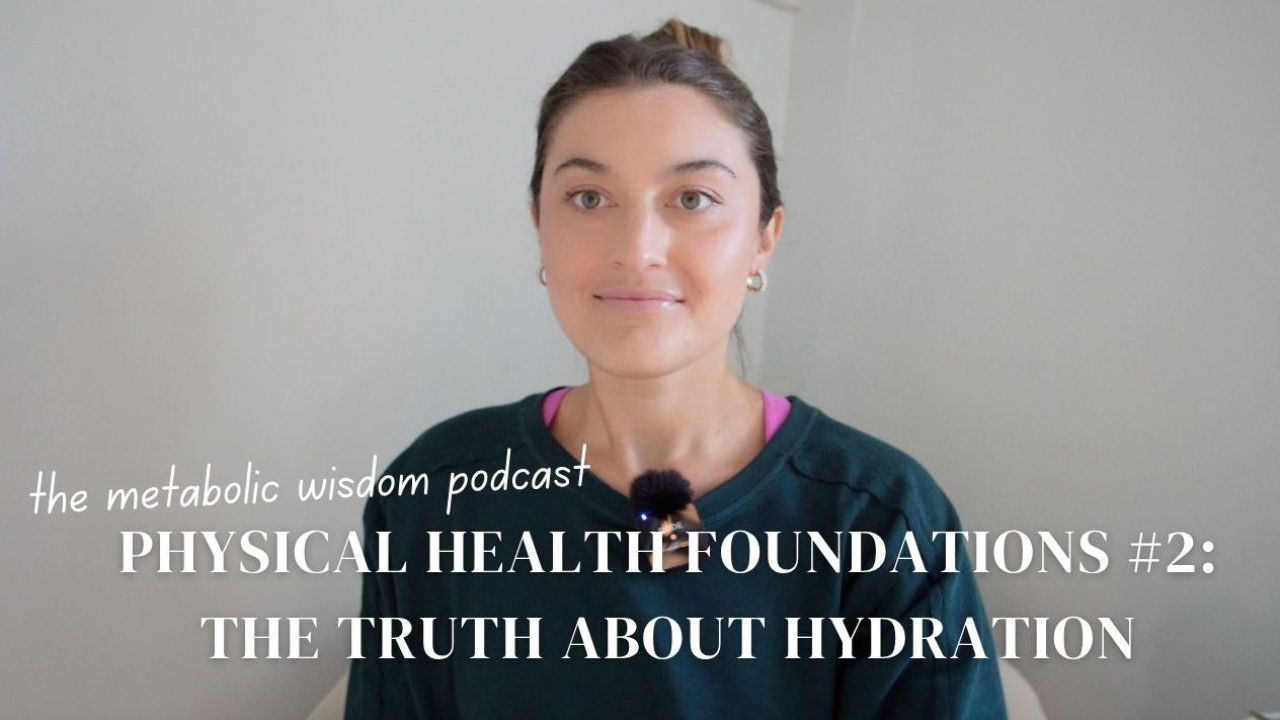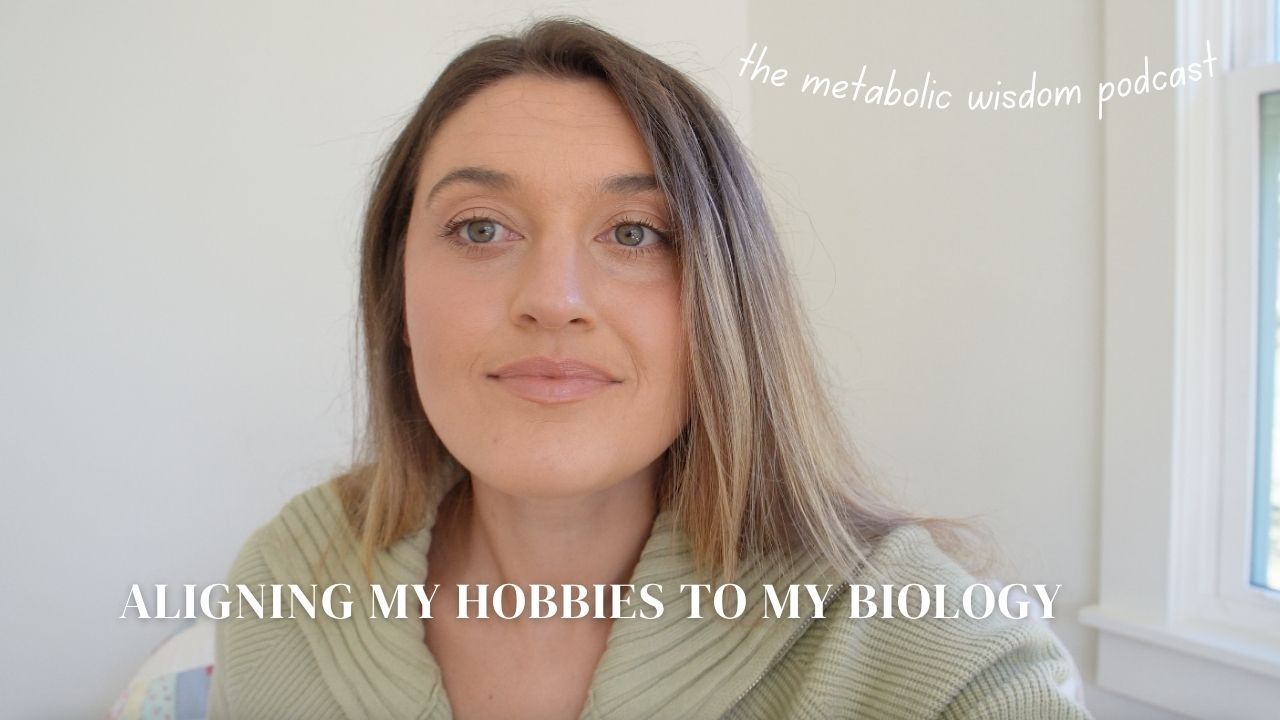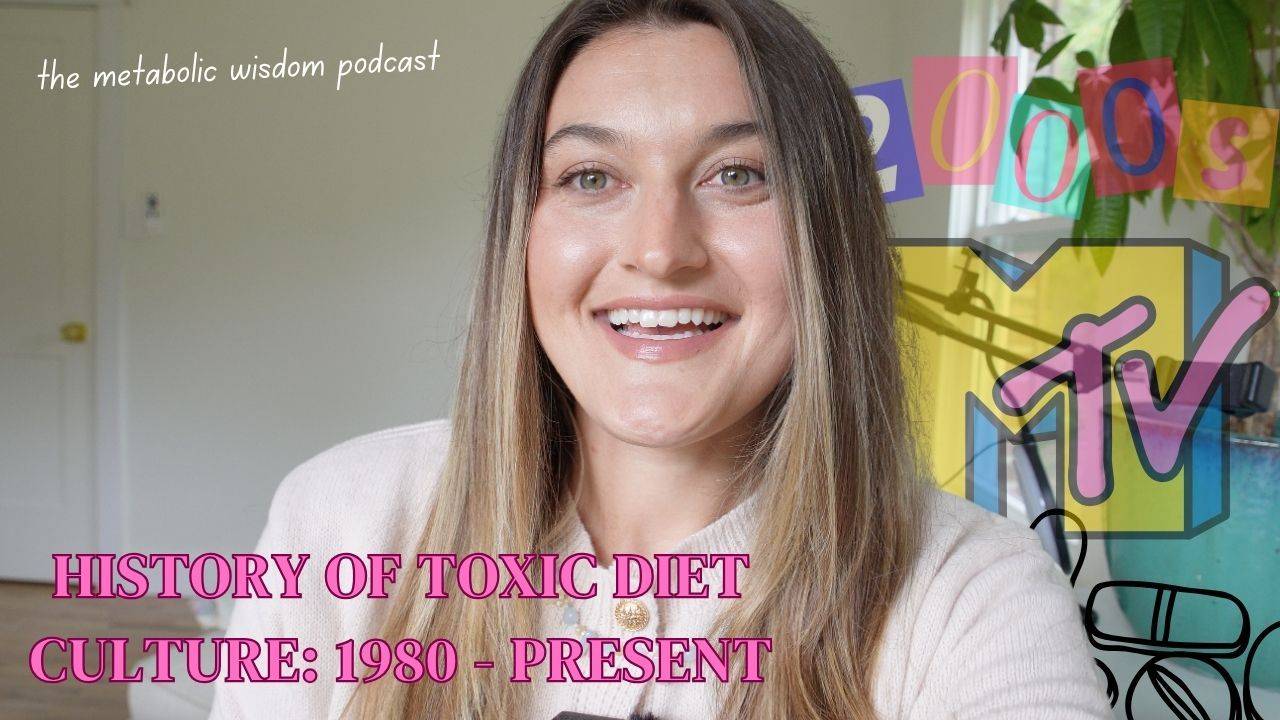Physical Health Foundations #2: Water Quality + Real Hydration

This is a podcast transcript from my Metabolic Wisdom Podcast! This episode streams on Spotify as well as YouTube!
Sara Childers (00:02.168)
Hey there, today we are talking about all things water, water quality, the intelligence of water, and I can't wait to share with you everything that I have researched in the last few years of being a holistic registered dietitian. So if you're new here, my name is Sarah Childers. I'm a holistic dietitian nutritionist, and in Metabolic Wisdom, my podcast, I talk about all things health, specifically for women, specifically for women who are Christians who want to do things in a more holistic, natural way.
And in the beginning of this podcast, we're in season one right now. I went over the foundations of health and I'm still going over the foundations of health. In the first three episodes, we talked about mind, spirit. And in the last episode, we talked about the physical foundations of health and getting started with your health with some of the most transformative, easy hacks. So the first hack was sinking your circadian rhythms or having a good sleep wake cycle.
having good light exposure. That is the most foundational thing you can do for your health. But in this episode, we're talking all about water quality and water intake. And the reason for this is because water is so highly consumed and we all need water. We can go weeks without eating, but we can only go days without drinking water. And not all water is created equal. So when we're...
drinking water and trying to stay really hydrated, it's actually more important that we have good quality over a lot of quantity. And that is kind of what spurred on this podcast episode. So I could clear the air on what water is, what water is used for in the body, how important it is, but also what types of water we should be putting in our body, what we really actually need to avoid and some of my favorite ways to stay hydrated. So.
buckle up, let's listen to this podcast, this information with an open mind. I don't want you to get overwhelmed though. I think that a lot of times, especially now in this capitalistic consumption minded culture we live in, everything seems like a sale. Everything seems like a sales pitch. seems like we're always being marketed to, there's always some sort of ulterior motive. So I want you to know that I'm not selling anything in this.
Sara Childers (02:19.281)
I'm giving you information that I have gleaned myself and I'm giving you some really good options to try, but this is nothing that you have to worry about. I think so many times with health and with health fads and trends, we as women get so caught up because we think, this little piece of health information is going to change everything for me. And we keep doing that and we keep consuming information. Then we get a few months down the road and we're constantly having anxiety about the different health.
we're trying to do like we have anxiety over what type of water we drink if anything has gluten in it if This is inflammatory does ever die. What's what's in this does this have phthalates BPAs? Why do we eat from plastic? You know I don't want us to get overwhelmed to the entire point of me doing these foundational episodes is for us to actually take into consideration what is most important and trying to prioritize the basics for health, but
also realizing that if we are in a good state of consciousness and if we can maintain a good state of consciousness, that is going to help us in and of itself. If we keep ourselves from getting overwhelmed and if we aren't so
legalistic for lack of a better term with our health if we are more fluid and open and you know not sweating all the small things I think we're honestly going to be better off. So without further ado I'm going to talk about all things water and the first thing I wanted to talk about when it came to water is how intelligent water is. So let's think beyond our bodies real quick let's think about in the earth mother nature now I'm fully under
the belief that God made the earth but let's think about the fact that he made water and air first and these are the most foundational elements and when we look at the earth we see tides we see that the earth is mostly made up of water and tides are intelligent they come in and they come out and they change high tide low tide the ocean has its own currents and when we see rivers or springs those also have currents and
Sara Childers (04:34.058)
you have things like waterfalls and like all these all this water just flowing in its own direction and it's as if it has a mind of its own because it kind of does. And I think that's super interesting to think about because as new research comes out we're actually seeing where water is intelligent and water actually can be influenced by either thought patterns, consciousness or whatnot. It can even be influenced
when we're talking about in terms of the earth, the gravitational pull and all of those things, water seems to have a mind of its own.
Sara Childers (05:15.434)
And when we think about water in our human bodies, it really does have a mind of its own. We're made up of 70 % water, kind of like the earth is. And when we think about everything that water does in the body, the list is super extensive. And...
Sara Childers (05:37.322)
Most of it is because of water's ionization or its electrical charge. So if you're not familiar with water, which you should probably be, this is basic biology, but I'll break it down for you. Water is H2O, hydrogen with two oxygen molecules on it. And when we're looking at the chemical structure of water, it looks kind of like an upside down V. With hydrogen at
the point of the V and then oxygen being the two legs of the V if that makes sense. So when we see water it looks like it's highly attractive. It could easily bind to another molecule because it kind of makes that V shape or that arrow shape or that triangle shape if you will. It's highly attractive to other elements and to other chemical molecules and so
that actually helps water to do what it needs to do in our own bodies and in the environment.
Sara Childers (07:04.36)
actually have a list of everything that water does in the body or just a short starter list of everything that water does in the body. So it facilitates digestion, it delivers nutrients and oxygen to the cells because it is highly attracted to other elements and it can help carry other elements. It removes toxins and cellular waste. Now this is assuming that you have water quality that is actually good and does not have toxins in it.
It facilitates chemical reactions, is pretty much everything that the body does as a chemical reaction. It allows our cells to communicate because of the electromagnetic charge of water, you can actually send signals through water.
Sara Childers (07:49.746)
It helps us to maintain a proper electrical charge in our bodies. It cushions bones and joints. It absorbs shock to the body. So when our body is shocked, water absorbs a lot of it so that we can be okay. It regulates our body temp and it even moistens the air and makes it easier for us to breathe.
Water does so much and that's why the quality is so much more important or just as important as the quantity. And I think it's so interesting when we're thinking about water and when we're thinking about how we can influence our own health and making things very simple. So I was looking into all things water. I teach about water in my Fully Feminine program, but I wanted to go beyond what I taught.
in this podcast episode and I was looking into the intelligence of water and I found this very interesting woman named Vida Austin and she talks all about the research or her research behind the intelligence of water. actually has a book called The Secret Intelligence of Water Macroscopic Evidence of Water Responding to Human Consciousness and this is basically a study of how when you freeze water
you can see it has a crystal structure. It's called a crystalline structure. And when she tested it, she tested it on two states of human consciousness. She had humans and their consciousness influencing different batches of water being frozen. One state of consciousness was love. One state of consciousness was hate. And they actually found that hate had a very chaotic, disruptive,
unorganized, unionized, structure, crystalline structure. And it seemed as though the water had a mind of its own, but it was very chaotic and it didn't even know how to, properly structure itself. Whereas when they had the consciousness batch of love or positivity or whatnot, the crystalline structure of that frozen water was actually super uniform and it was
Sara Childers (10:07.658)
harmonized, was in certain patterns, it was very symmetrical. And I know that when I talked about mind and spirit in the first two episodes, I talked a lot about how our body is actually influenced by our state of consciousness, by our thoughts, by our thought patterns. And I think this just goes to show that that's kind of proof of that. We're made up of 70 % water and if water has a mind of its own and if it's influenced by our state of consciousness,
It might not work as well if we're constantly in a bad state of consciousness, if we're constantly finding things that are wrong with our lives without any hope, when we're just picking things to be mad about, when we're negative or hateful and have a bad state of consciousness, our body is dysregulated because we're mostly water. But then when we have that symmetrical structure and when we are having higher thoughts and we are exuding love and hope, I think that creates that crystalline structure.
not even with just that sample of the frozen ice, but also in our own bodies. So if you get anything from this podcast, I hope you know that no matter what your water quality is, pray over your water, pray over your food, pray over yourself. Try to have that good state of consciousness because if that can influence your water more than anything else, that's free. That is something that you can do no matter where you're at and no matter what your choices are financially when it comes.
to the kind of water quality you have. But I did want to get into water quality and what all contaminates water because that is a super, super, super big problem in a lot of my clients is their water quality is not good. And sometimes this can be the reason why they might have certain toxicities or why their hair test that I do with so many clients comes back not great. They're deficient in certain electrolytes that they should have in their diet. But then...
They're toxic in certain elements that they should not have in their cells like copper, arsenic, and all the things. So when you're actually looking into the quality of water, most people drink tap water and tap water is so bad for you. Tap water is absolutely horrible for you. And I'm not trying to be dramatic here and I don't want to make anybody feel bad, but you can look at the CDC's website and other national organizations, their websites.
Sara Childers (12:28.692)
and you can actually find what all is contaminated in our tap water. when we're thinking about just America, the United States and our water quality from city to city, every water quality is different, but the methods that each city uses in order to filter and facilitate its city water is relatively the same. So I actually have a lot of people in my life who are highly connected to
different water departments and I even have some people who are chemical engineers that I'm friends with and as I have been talking about health, you know, with people that I know in my personal life, I've been able to learn what all contaminates water just in my own town. And while drinking water from the tap is never going to make you like chronically poisoned, like you can't get poisoned from water.
you actually can experience some mild dysregulation with it. And that's kind of what we're getting into because the littlest things do actually help with your health, especially if you drink water every day, three times a day with your meals and between your meals in order to stay as hydrated as you need to stay. So I was actually talking to a friend the other day who is a chemical engineer. We were talking about water quality and he was talking about how
hard it is to filter out for an entire city, their water to be properly filtered as much as it needs to be, especially with so many things going into water now that we never had before, like pharmaceuticals and heavy metals and corrosion of pipes and all of the things. And if you actually look into like the CDC and the different websites that show water quality, you can even Google your own town's water quality, your water department at your local
Your local water department whatever city you're in should have a report every single year of what all is in your water And you should be able to look at it, and that's what I did for mine but Some things that are usually contaminated in tap water are of course like the chemicals heavy metals and microorganisms But specifically heavy metals like arsenic lead Nitrates so nitrates are something that cause a lot of inflammation They're usually in meats and that's why a lot of people are advised to stay away from things like sausages because it causes a lot of inflammation
Sara Childers (14:51.85)
fluoride, chlorine, now those are a bit more controversial, it depends on what side of the coin you're on, whether you think fluoride or fluoride should be in tap water or not. PFAS, PIFAs, copper, mercury, bacteria, viruses, disinfecting byproducts, pharmaceuticals, pesticides, and now they're finding even microplastics in tap water. So really finding a good solution to this.
is hard and sometimes it requires either an investment in time or an investment in money. But water quality when you think about it is so important because if you're eating organic or if you are making all your foods homemade, you're still using water to make that rice. You're still using that tap water to rinse those vegetables. You still are drinking the water and you have it in almost every single meal in some capacity, even if you aren't drinking it exactly.
it can still be contaminating your food.
Sara Childers (15:53.246)
There actually is testing you can do as well. ETR Water Testing is a website where you can order a really in-depth water quality test to see what your water is looking like.
Sara Childers (16:09.46)
So let's go over the best water sources. So I have written down here, spring water, alkaline water, ionized water, basically any sort of filtered water that you can have as long as you have minerals with it. So what I think is so interesting is that spring water is some of the best water that you can drink. And so many people kind of joke like, my gosh, spring water, that's gonna give me diarrhea.
One of the reasons I think that is is because it's very mineral rich and minerals actually help with your digestion and it helps you to use the bathroom more regularly and There's not many Springs left that people are actually drinking from because there's so much contamination with like agriculture and cities But there are a few places that still have really good Springs that aren't contaminated that you can drink from the water is not only mineral rich, but naturally as a spring flows
It usually flows through rocks and sand and it creates this natural filtration process. And when it flows, it is ionized. So ionized water is like electrically charged water kind of. And that is the type of water that binds so well with your cells and works so well in your body. Cause it kind of has that like current to it. If that makes sense. It's structured water. And there's actually ones that you can get now.
where you can like structure your water if you can't afford spring water or if you don't have a spring to go to where you can structure your water as if it were in it from a spring. It's like 200 bucks. It's like, I think it's called Onasana or...
on a lima, excuse me. But there's some cheaper ones on Amazon that aren't like $200 that you can get, but I don't know how well they work. But spring water is very natural. And I think it's so funny because everything that is like the best of the best is just super simple. And what people had before the enlightenment, what people had before all these water systems, it's what we had before. It's what our ancestors had that works the best. And it's so funny, there's a spring.
Sara Childers (18:17.05)
in my town that people still get water from and still drink from some. And my aunt goes and she'll get gallons and gallons and gallons of water from this spring. And she filters it out kind of with a cheesecloth that comes out in a spigot. And she swears up and down that that water has changed her health. Like she was doing so well with her health and she had lost a lot of weight, both her and my cousin had. And she didn't change anything but the kind of water that she drank. And she was like, it's...
amazing. I know that I'm so much more hydrated. It makes such a difference. And I've even had people who are on the more holistic side as well, like holistic professionals, like assisted lymphatic drainage therapists, tell me about how the pH and the ionization or the structure of water being one of the ways that they either recovered from cancer or either helped them prevent a lot of disease that they were developing.
before they started drinking the structured water. So it's so interesting to think about. But if you're someone who is like, don't have access to a spring and you know that the spring water that they sell in the plastic water bottles at Walmart, that's not really what we mean when we say spring water. You kind of do have to have access to a spring to have all those good benefits of it being like.
ionized and structured and everything but Because when water has been sitting and stagnant for a really long time, that's just not good and it messes with the structure But if that's not you because I don't have time to go to a spring every day and fetch water I don't really have time for that in my most ideal dream scenario I would live on some land with a natural spring and be like totally off-grid but here we are and we are not in that reality, so Some things you can do you can actually get filters
that alkanize or ionize your water, which is kind of like the effect of what a spring would have. But you have to add minerals back into it. And there are so many different price points and there's so many different brands out there that actually offer this service for water. So it would probably be good to look at a lot of reviews, see what actually works so that you can make a really informed decision about like your water quality and what you're gonna invest in.
Sara Childers (20:43.506)
Me and my husband, we actually installed a three-part water filtration system on our new house that we have coming in. It's a whole house filtration system just because I noticed that even the water I bathed in was affecting my skin and my hair. Sometimes really hard water will cause you to have more dandruff or because there's bacteria in it and bacteria, dandruff is actually caused by a certain bacteria usually that can be in tap water.
or it can at least corrode in your shower head. So we have added a whole house filtration system to our new home we're about to move into. And we have under the sink filtration systems now, but this is a three step system that's going to help with the pH of the water, but we will likely have to add minerals back in. Cause things like alkanized filters and reverse osmosis filters.
on your water are good and they help with purity but you always need to add in something like some sea salt, Celtic salt, the Baja gold salt or something or maybe even like a lemon juice or something to the water or a simple electrolyte mix would work as well to actually make it have everything you need. Now I don't want you to think oh my Brita is doing the trick or oh my Berkey's doing the trick.
Those are not the water filtration systems I'm talking about. Brita's do next to nothing for water. Your water filtration system on your fridge probably not doing anything for your water. They've actually had a lot of people come out about how the Berkey is actually not as effective or as good. Sometimes can cause either mold or bacteria to build up in your water. So I highly recommend like a filtration system.
on your water for your home or at least the spigot or faucet that you will be drinking out of. And this sounds like something like, gosh, this is another thing I have to invest in. But when you think about how important water is, when you think about how much you're gonna be drinking that stuff and how much of a difference it can make, it's worth the investment to invest in something like a high quality water and high quality food so that you don't have to constantly be searching for this magic supplement to fix all your problems.
Sara Childers (23:08.026)
or looking for the next health tool or biohacking tool to fix everything when you can really just invest in good food and good water and then enjoy all of the good biohacking that is free, like fresh air, grounding, sunset, natural lighting, fire instead of blue light, enjoying those things that are completely free. And all of those things usually help with your health.
Sara Childers (23:42.248)
And when our water is alkaline and our pH in our body is balanced, we're automatically going to have less inflammation. But also when our water is charged correctly, that also helps with our nutrient absorption and actually absorbing and utilizing the nutrients we get from food even more. Because that is what it's all about is bioavailability. So in our bodies, every nutrient hormone water molecule has a chemical structure.
and it has to be used well by the body. Think of all of these things as puzzle pieces. The puzzle pieces have to fit together perfectly. You're not gonna put the wrong two puzzle pieces together and assume that the entire puzzle is going to look right. When we're putting molecules, elements, enzymes, water molecules, nutrients together in the body, they actually have to fit the mold. So when we have a lot of things that are in our body,
that aren't fitting the mold, say it's heavy metals, contaminants, unstructured water, those things are like putting all of the wrong puzzle pieces together and thinking that the puzzle's gonna turn out fine.
Sara Childers (24:58.858)
I also remember when everybody used to drink distilled water. I know this is something that I had a few family members that did for a long time is drinking distilled water. Now distilled water is high in purity, but you have to add minerals back into it or it doesn't work well because the purity of distilled water, it's so pure that all of the good stuff and the bad stuff is gone.
So you have to add those minerals back in in order to get the benefit from it.
Sara Childers (26:12.71)
If we're wanting to get super homemade with the pH of water, if you're wanting to make your water alkaline, like say you have distilled water, reverse osmosis water, like some sort of water that is healthy and filtered, but you want to help with the pH of the water, because maybe you don't have this fancy alkaline machine. Some things you can do to really help with the alkaline water tactic is to, you can add mineral drops to your water, minerals make the pH.
more alkaline, which makes it better for your body. But also you can add in baking soda. Baking soda is super alkaline. And I've had so many people tell me about their chronic disease, tell me about their family member with cancer, tell me about something that they battled and actually using things that were more alkaline, like baking soda in their water, just a pinch of it, made the biggest difference for inflammation. And that's something that is like very low cost and baking soda is
natural-ish and just something to try. You can also put lemon juice in your water. It initially has an acidic effect but it eventually does help with the pH of water.
Sara Childers (27:25.01)
And magnesium, calcium, and potassium, those are actually the three minerals that help water to be more alkaline. And what I think is so interesting is that those are also minerals that most women that I do hair tests on are deficient in. So we have our four major minerals. Those are three of our four major minerals. We have sodium, potassium, magnesium, and calcium. And those are the four most abundant minerals in our body, the most important. And you really can't change anything about your health until you've changed these minerals.
and until you've gotten these minerals up to a good balance and a good store in your body at a good level. And nine times out of 10, honestly, 10 times out of 10, when I do an HTMA test on a client, they are low in these minerals. And I think it's interesting because a lot of people drink tap water, which has none of these minerals in it, barely any, and they drink this tap water and then they get constipated.
because they're deficient in potassium and magnesium and calcium. And those are things that not only help the pH of your water and are not found in tap water, but they're also things that are drained when you're stressed. Like when you're stressed, your body uses up your magnesium, potassium and sodium and calcium all too quickly. And it's something that we're not really replenishing in our water. So one of the first things that we do with clients that we do an HTMA test on, we work with in my programs is,
really improve their water quality and add minerals like sodium, potassium and magnesium and even calcium back in. And they start to see they have regular bowel movements, more energy, just all around feeling better just from changing their water or adding in those minerals. And that is one of the biggest reasons why having a high mineral water or having a natural water is so important.
Sara Childers (29:23.698)
is making sure you have electrolytes.
One of my favorite brands is the Jigsaw potassium cocktail. And I also love Dr. Berg's electrolyte no sugar added powder. That's two electrolyte mixes that I heavily, heavily, heavily recommend to all of my clients. But you can even use things like Trace Minerals. That brand has a a great mineral drop. It doesn't taste the absolute best, but it's super efficient and a great way to add minerals to your diet.
Sara Childers (29:59.201)
And this doesn't mean to only drink really high quality water. And even if you have one bottle of quality water, that's better than having a gallon of poor quality water. It's not necessarily true. We still want to be well hydrated. I actually have a list of symptoms here of whether or not you're well hydrated. So if you're well hydrated, you're going to have normal thirst, mental clarity, tears and saliva.
light urine and regular bowel movements, and pinched skin will go back to normal very easily. So that is if you're well hydrated. These are just some symptoms you can look for. If you're mildly dehydrated, which most of us walk around in a mildly dehydrated state. In this case, you're thirsty, you have headaches, dry mouth, dry eyes, constipation, fatigue, you feel irritable, and you might have more of a brighter color urine. And when you're severely dehydrated,
You are not thirsty, you have low blood pressure, have rapid heartbeat, sunken dry eyes, dark urine, and when you pinch the skin it is slower to return. Now I wish I could tell you that I am well hydrated. I wish I could tell you that I'm always well hydrated and I currently am. I got an in-body scan just yesterday that told me that I was very well hydrated. But on the regular or in the past few months, one of the things that has been a struggle is hydration and getting enough water. Because it's hard to know. I ask clients all the time, how much water do you drink?
and they're always like either none or they drink like 10 gallons a day. So we don't wanna be drinking two gallons of water a day. Having half of your body weight in water, in pounds, is how much you wanna have in ounces every day of water. So for instance, if I were 140, I'm not, but if I was 140 pounds, I would drink 70 ounces of water and that would be a good amount for me to have every day.
70 ounces of water. You don't have to drink 10 gallons of water. Stop doing that. You're actually over hydrating. So many people over hydrate and that's why they also don't feel good. It's balance. A lot of times when we in our society see a health trend, we just really pound whatever that health trend is and we get gluttonous with it. We go to an extreme with it. We're always like if protein is good, we're always just pounding the protein, eating way too much protein.
Sara Childers (32:24.418)
some protein we could probably like harm our kidneys and when water is good, water is good, pound the water, drink eight gallons a day, blah blah blah. Like there's a balance with everything. That's actually how life works is when you have a good balance things are better so you never want to go one way too much or one way to the other. We just want balance. So having half of your weight in ounces being your water intake is absolutely fine. You don't have to do more of that.
Sara Childers (32:57.996)
Too much water can impair digestion and it can also cause things like bloating, especially if you drink a lot of water at meals, it can actually impair your digestive juices, your digestive enzymes, and can cause you to have things like reflux or bloatedness. So it's really not good that we have it too much.
Some of my favorite ways to hydrate is with things other than water. So I do a water filtration. I always put lemon or a pinch of salt in my water, but I love certain waters that are just so high in minerals, so high in potassium that really help with digestion, regularity, mineral balance. I love coconut water. Coconut water is a great way to get in some natural electrolytes and also aloe vera water. If you can find some that doesn't have sugar added to it.
I think aloe vera water is a great, great, great way to get a lot of nutrients into your diet. And it's not anything that you have to necessarily filter out. So you just buy the water, you buy the aloe vera water or the coconut water, no sugar added. You drink that with some filtered water that has either lemon juice or baking soda or salt in it and drink that and make sure you're getting your half of your body weight in ounces every day and you should be good. I wouldn't overthink it.
If there's a spring that you can try that is not contaminated that is a good option. I would definitely try that out. Even if you feel like this is weird, whatever. Humans were meant to survive out in the wild. We were meant to have natural sources of water. That is just how God created this earth to provide everything we needed for us in this earth to thrive. So I think going back to the basics and just having a good state of consciousness.
not getting overwhelmed, but doing what we can to either filter our water, alkaline our water, or just improve the pH or structure of our water within our financial means is going to be the best option for us. And even if you're somebody who can't afford anything right now, I will say most springs are free. If you can locate one in your area, most all springs are free. So that could be a good option for you. But if you don't have the access to that,
Sara Childers (35:12.224)
doing the best that you can to filter out your water as much as you can and then adding in those really low cost supplements or minerals like baking soda or lemon juice is gonna be your best option.
If you enjoyed this podcast, please subscribe to this channel, this YouTube channel or this podcast. And if you're interested in learning about some of my services, such as my 12 week Fully Feminine program or my one time HTML testing, you can go to Sarah Childers nutrition.com. The link will be down below from there. You can also join my email list where I release a detailed version of this podcast, along with a lot of good resources that go along with each podcast episode every single week and hop on that and enjoy.
I'll see you next time. Bye.






